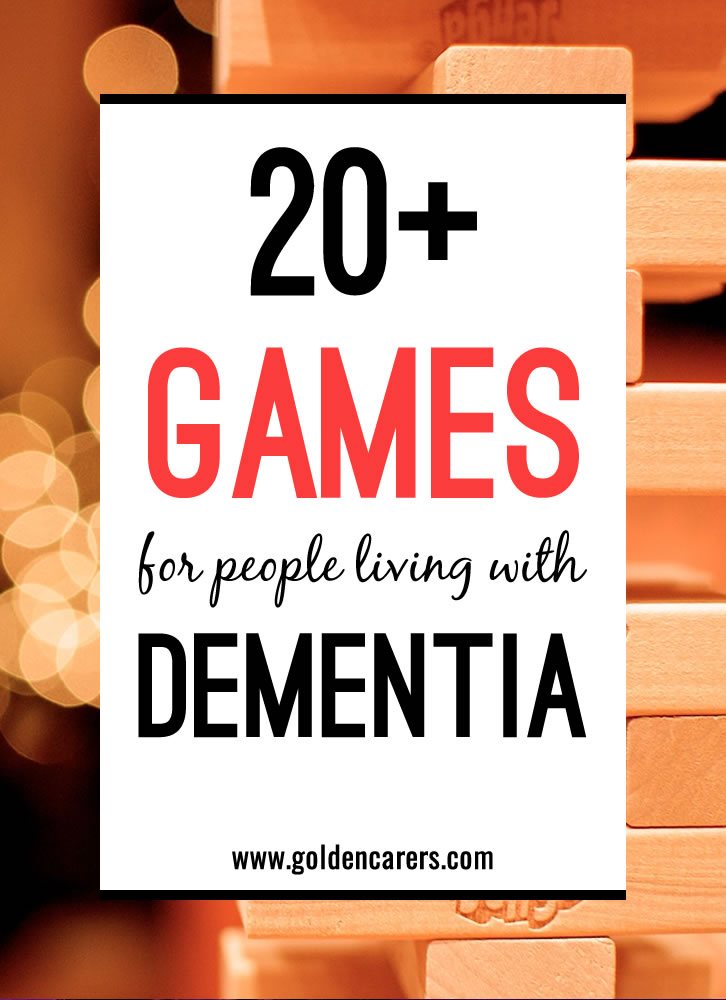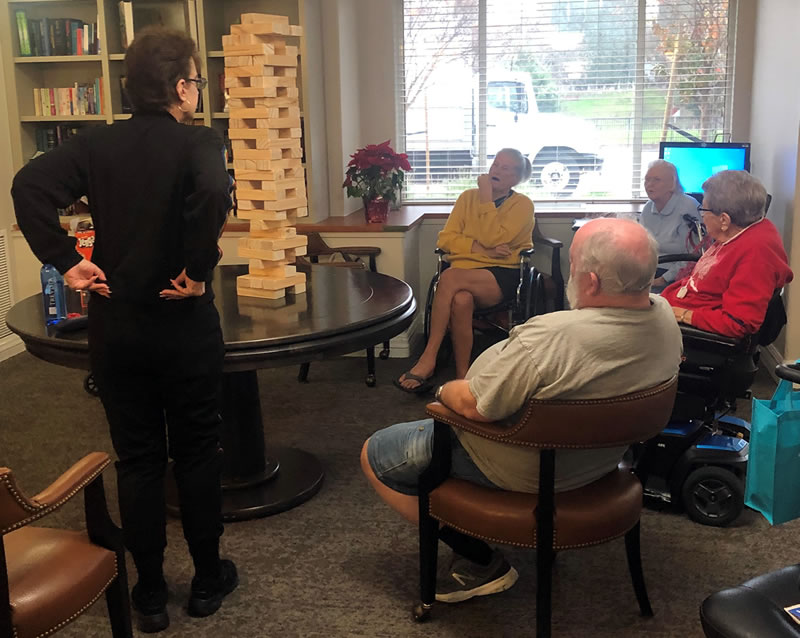
Games for People Living with Dementia
Found In: ›Activities ›Alzheimer's & Dementia ›Games ›Articles

Playing games in long term care facilities & nursing homes offers clients much more than just entertainment. The impact that playing games has on the health and well-being of individuals has been well documented.
Playing games provides an important source of relaxation, socialization and mental stimulation.
In this article we cover:
- Benefits of Playing Games
- Adapting Games to Match Abilities
- 20+ Games for People Living with Dementia
Related Activities
Comments Post a Comment
 22nd Jul 2023
Resident Enrichment Assistant
22nd Jul 2023
Resident Enrichment Assistant
Thank you!!!

 21st Aug 2023
Activity Director
21st Aug 2023
Activity Director
Glad this makes your job easier. You must be a great activity Director.
I just discovered your site by chance! I’ve just started a new role as wellness & lifestyle coordinator for a dementia specific facility.
Im so excited to be part of the golden carers community - a wealth of knowledge & resources.
Thank you!

 9th Nov 2022
Activity Director
9th Nov 2022
Activity Director
Thank you for your kind words
You are right there are many good activities here


 5th Apr 2021
Activity Director
5th Apr 2021
Activity Director
https://www.goldencarers.com/flip-cards-and-dice-matching-game/7052/
This is my first post, I’ve been an activities co-ordinator now for only two weeks, I’m struggling to motivate the men in my home, I work with elderly mentally ill with challenging behaviour, mainly late stages of dementia, apart from throwing a ball or dominoes nothing else seems to interest them. . . . Help please

 19th Mar 2021
Activity Director
19th Mar 2021
Activity Director
First of all congratulations on your new job
Two weeks is hardly enough time to get to know the residents
The group you were talking about is very challenging so you need to use any help at your disposal
Talk to the staff and family members to see what these men used to like
The fact that you get them played ball games and dominoes is greatMaybe you can extend these activities by relating something else to them
You might want to try balloon activities because they’re similar balls
https://www.goldencarers.com/search/?search_tag=Activity&search=Balloon%20games
If you do trivia give the residents a choice of two answers and asked him to pick the right one that way they have a 50% chance of being right or do True and false trivia
https://www.goldencarers.com/true-or-false-word-game/5405/
You might want to try your matching games especially those with cars or other things men might like
https://www.goldencarers.com/how-to-use-conversation-cards-to-connect-residents/7082/
https://www.goldencarers.com/name-the-car-logos-visual-quiz/5874/
https://www.goldencarers.com/guess-the-classic-car-quiz/6613/
Here are some other men’s activities that might help you
https://www.goldencarers.com/mens-group-/3498/
https://www.goldencarers.com/activities-for-men/5042/
Before you spend a lot of time planning and actively make sure you find out the interests of you group
I find food to be a great motivation to get participation
With this group of residents
A lot of it is trial and error
What works one day may not work the next
Hi find that using my I triple E formula helps to make and the activity successful
That is you need to involve everyone
Be excited enthusiastic and engaging
I would think of it as putting on a performance
There is a lot of material here if you need any more help let me know
Need more ideas what we can do to stimulate the residents. More ideas welcome please.
 27th Apr 2020
27th Apr 2020


 2nd Mar 2020
Activity Director
2nd Mar 2020
Activity Director
So glad they enjoyed it
 1st Mar 2020
Activitiy Director
1st Mar 2020
Activitiy Director

 14th Jan 2020
Activity Director
14th Jan 2020
Activity Director
Thank you

 21st Oct 2019
Activity Director
21st Oct 2019
Activity Director
I think the games listed here are pretty good is there something specific you had in mind ??

 23rd Sep 2019
Activity Director
23rd Sep 2019
Activity Director
We had a resident like this and that seemed to help sometimes
 2nd Sep 2019
Volunteer
2nd Sep 2019
Volunteer

 3rd Sep 2019
Activity Director
3rd Sep 2019
Activity Director
Could you give us more information about the dice game Tenzi
Could you put the comment in the forum section which says start a new discussion
Thank you


 21st Aug 2019
Activity Director
21st Aug 2019
Activity Director
 2nd Aug 2019
2nd Aug 2019
It is my goal every day to get her moving and happy for some parts of the day.
We enjoy doing chair Hokey Pokey. Make up fun names for different chair exercises: like when lifting arms up we sing " I will fly away". when walking " play marching songs", brush your teeth songs.. I found music really helps us all through the day! .. My Dear client has had Rheumatoid arthritis for years. The damage has caused much damage to feet and hands/knees. She loves to Sing and remembers old nursery rhymes. She has learned ( shocking right) how to use my cell phone.. slides the finger across and how to hold it still for you tube songs! She does not speak much but we Sing and sing out loud! Great for her lungs! And when I get her up off the Potty chair.. and cleaned I have her put her hands on my shoulders.. while pulling up depends- afterwards we hug and sway to me singing. So play music, sing with joy. I am working on making drums and music chimes maybe...
 2nd Feb 2019
2nd Feb 2019
https://www.goldencarers.com/10-ways-to-increase-activity-participation/4133/
https://www.goldencarers.com/whats-new-in-board-games-for-seniors/5288/
https://www.goldencarers.com/how-to-motivate-residents-in-long-term-care/3742/
https://www.goldencarers.com/playing-cards-all-inclusive-games-for-seniors/5236/
 18th Nov 2018
18th Nov 2018
 3rd Sep 2018
3rd Sep 2018
 26th Aug 2018
26th Aug 2018
https://www.goldencarers.com/15-uplifting-activities-for-people-confined-to-bed/3783/
 5th Jul 2017
Activities Coordinator
5th Jul 2017
Activities Coordinator
I was running out of ideas to keep residents stimulated not any more.
Thank you
 5th Jul 2017
5th Jul 2017
 9th Feb 2017
9th Feb 2017
https://www.goldencarers.com/10-ways-to-increase-activity-participation/4133/
https://www.goldencarers.com/how-to-motivate-residents-in-long-term-care/3742/
 23rd Aug 2018
Volunteer
23rd Aug 2018
Volunteer
 9th Feb 2017
9th Feb 2017

 26th Jul 2016
ACTIVITIES ASSISTANT
26th Jul 2016
ACTIVITIES ASSISTANT
 27th Jul 2016
27th Jul 2016
 7th Oct 2016
Support Worker / RAO
7th Oct 2016
Support Worker / RAO

 Easy Crossword #3
Easy Crossword #3
 How to Create a Calm Environment for Memory Care
How to Create a Calm Environment for Memory Care
 Mixed Media Collages for the Elderly
Mixed Media Collages for the Elderly
 Name the Carpentry Tools
Name the Carpentry Tools



You have come to the right place that I’m many activities, here bath, and the vegetable and four groups
If Do you have more specifics then I can probably help you further
But I think question in the form section instead of the comment section
I look forward to helping you